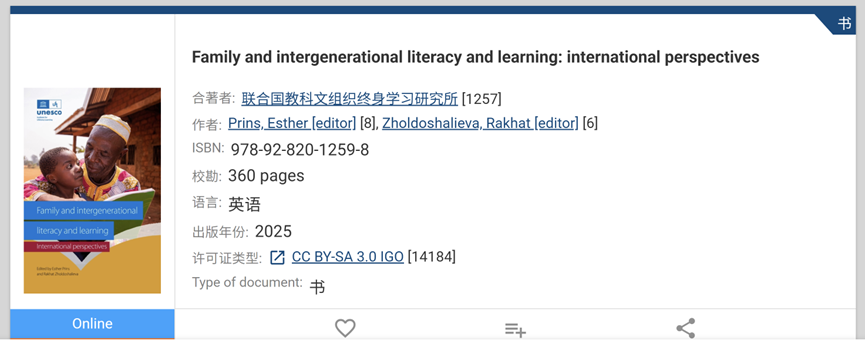East side of 7th Floor, No. 3663, North
Zhongshan Road, Shanghai, China, 200062
Tel: +86 21 6223 2322
www.smile.ecnu.edu.cn
Family and Intergenerational Literacy and Learning: International Perspectiveswas officially launched at a UNESCO Symposium on April 2, 2025. The eBook is now available for download via the UNESCO Digital Library. Chapter 9 of the book was co-authored by Li Yan, part-time researcherof the ShanghaiMunicipalInstitute for Lifelong Education(SMILE)and associate professor at the Facultyof Education, Jiangnan University; Seyda Subasi Singh, researcherof the University of Vienna, Austria; and Li Jiacheng, professor and Executive Vice President ofSMILE. This chapter focuses on intergenerational interactions and early learning in rural Chinese families.

The book posits that the educational challenges we face today are complex. They demand thoughtful, cohesive responses that span formal and non-formal learning contexts and consider the learning needs of every community member, throughout their lives and in all the settings in which they learn.
Family and intergenerational literacy and learning (FILL) is an essential, if undervalued, part of this picture, especially in the discourse on lifelong learning in different historical, social, cultural, economic and livelihood contexts. It has demonstrable benefits, not only for the children and adults who take part in it, but for the wider community. It helps families to become more adaptable and resilient and to improve their life chances, while developing confident, empowered learners. It is also an anchor during times when access to education is limited for public health or political reasons, especially for girls and women.
For learning to be truly transformative, in the way envisaged by UNESCO and the United Nations, it must be part of the day-to-day life of every family. By investing in FILL and learning, we put into families’hands the means to make better futures, for themselves and their communities.
Yet, for all this promise, family learning remains under-researched and underappreciated. With a few notable exceptions, most of the existing literature focuses on countries in the Global North. Little is known, by comparison, about family learning in the low- or middle-income, non-Anglophone nations in which most of the people in the world live.
This book, co-edited byDr. Esther Prins from The Pennsylvania State University in the United States of Americaand Dr. Rakhat Zholdoshalievafrom the UNESCO Institute for Lifelong Learning, brings together 20 research cases spanning cross-linguistic and cultural boundaries. It highlights innovative practices in Global South countries, particularly emphasizing how the countries at one time colonizedare constructing culturally rooted family learning models through reviving traditional languages and intergenerational knowledge transmission systems.
One theme emerges very clearly from these studies: There is more than one route to literacy and learning. The chapters in this book highlight that by marginalizing other cultures, other languages or other literacy practices, we commit epistemic injustice, stifle communities and prevent them from thriving. Family learning works best, and becomes even more sustainable, when it grows with the grain of local history, culture and tradition, not against it.
This book offers valuable practical frameworks to policy-makers, educators, and scholars. Its publication will significantly advance global education equity initiatives, ensuring equitable access to inclusive lifelong learning opportunities for communities across all geographical and cultural contexts.